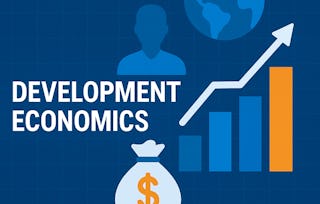African development – from the past to the present -- offers a unique economic history perspective on Africa's development. Over a period of five weeks, the course covers a logical account of historical events and decisions that have shaped the current political-economical landscape of Sub-Saharan Africa - from the pre-colonial and the colonial era, to the era of liberalisation, modern day Africa and the future prospects of the continent.

African development – from the past to the present
6 days left! Gain next-level skills with Coursera Plus for $199 (regularly $399). Save now.

African development – from the past to the present

Instructor: Ellen Hillbom
7,292 already enrolled
Included with
(59 reviews)
What you'll learn
Appreciate the historical poltical-economical conditions having shaped current day Sub-Saharan Africa.
A primer into approaching economical development from an economical-historical point of departure.
Skills you'll gain
Details to know

Add to your LinkedIn profile
See how employees at top companies are mastering in-demand skills

There are 5 modules in this course
In this introductory module I begin by speaking of my intentions when creating the course as well as the course structure and literature. Next, I explain the key theoretical concepts that I use throughout the course. Finally, I give an overview of how the literature on African history has evolved.
What's included
3 videos3 readings3 assignments
I spend limited time discussing Africa’s long history before colonization. Instead, I have chosen to focus the course on more recent events. Still, I aim to convey a basic understanding of the long-term development of economic systems, state formation, and trade networks.
What's included
3 videos3 readings3 assignments
European colonialism had a profound impact on Africa’s development, but the way it affected people’s lives differed between regions, societies, and groups of people. I this module, I problematize and specify the impact. I also discuss the agency of different European and African interest groups.
What's included
5 videos5 readings5 assignments1 peer review
After the end of World War II, African countries experienced both progress and crisis. This module covers the time from the early independence movements to the effects of the Structural Adjustment Programs. The central theme is the challenge of economic diversification and sectorial change.
What's included
5 videos5 readings5 assignments
Since the 1960s, there has been major socio-economic change in Africa. I organize this change thematically to discuss population growth, urbanization, and regional integration. I then move on to scrutinize the current positive economic and political development. I end with discussing Africa’s changing role in the global economy.
What's included
7 videos6 readings6 assignments1 peer review
Instructor

Offered by
Explore more from Economics
 Status: Preview
Status: PreviewUniversità di Napoli Federico II
 Status: Preview
Status: PreviewO.P. Jindal Global University
 Status: Preview
Status: PreviewÉcole Polytechnique Fédérale de Lausanne
 Status: Preview
Status: PreviewBanco Interamericano de Desarrollo
Why people choose Coursera for their career

Felipe M.

Jennifer J.

Larry W.

Chaitanya A.
Learner reviews
- 5 stars
59.32%
- 4 stars
22.03%
- 3 stars
5.08%
- 2 stars
1.69%
- 1 star
11.86%
Showing 3 of 59
Reviewed on Aug 25, 2021
It was excellent course and great information to know about african history and boost knowledge.
Reviewed on May 9, 2021
The course was very informative and it will be a very good source for anyone who wants to learn more about Africa.

Open new doors with Coursera Plus
Unlimited access to 10,000+ world-class courses, hands-on projects, and job-ready certificate programs - all included in your subscription
Advance your career with an online degree
Earn a degree from world-class universities - 100% online
Join over 3,400 global companies that choose Coursera for Business
Upskill your employees to excel in the digital economy
Frequently asked questions
To access the course materials, assignments and to earn a Certificate, you will need to purchase the Certificate experience when you enroll in a course. You can try a Free Trial instead, or apply for Financial Aid. The course may offer 'Full Course, No Certificate' instead. This option lets you see all course materials, submit required assessments, and get a final grade. This also means that you will not be able to purchase a Certificate experience.
When you purchase a Certificate you get access to all course materials, including graded assignments. Upon completing the course, your electronic Certificate will be added to your Accomplishments page - from there, you can print your Certificate or add it to your LinkedIn profile.
Yes. In select learning programs, you can apply for financial aid or a scholarship if you can’t afford the enrollment fee. If fin aid or scholarship is available for your learning program selection, you’ll find a link to apply on the description page.
More questions
Financial aid available,
¹ Some assignments in this course are AI-graded. For these assignments, your data will be used in accordance with Coursera's Privacy Notice.

